- Home
- Carol Bruneau
Brighten the Corner Where You Are Page 5
Brighten the Corner Where You Are Read online
Page 5
Ev looped the string over my head and round my neck to keep the sign from sliding off my lap. “You warm enough?” He rubbed his hands together. Despite the sun shining down from the clear March sky, the wind coming off the bay sent a rawness into my bones, never mind I was bundled tight as a sausage in its casing. Under my red sweater and coat, I had my apron on over top of my blouse and skirt. Even with my toque pulled down low, in a matter of minutes the wind gave me an ice-cream headache. I could’ve used mitts, and pulled my sleeves down over both fists. If I’d been wearing my ring it would have snagged the wool. Ev breezed close, rubbed both my hands between his to warm them. I like to think if I had been wearing the ring he would have run his thumb over it, even fondly. In a rush he yanked up my sleeves, rolled them up one by one. “It ain’t that cold, now. You want folks to see your hands.”
“Think I’m like you?” I laughed as I said it, made my voice as sweet as a song sparrow’s. Just as I spoke an oil truck barrelled past spitting gravel, and I doubt Ev heard me. The roar shook Willard from his roost on the topmost bough above Matilda in her nest. For two whole days, those birds and their yearlings had kept me entertained, flitting back and forth ferrying twigs and grass and more pieces of twine dropped by the mailman. Back and forth they went until the nest was finished. A good solid one I hoped it was, that would withstand spring storms and the heavy snow that was bound to come between now and Eastertime.
“Fuckin’ maniac, slow down! Driving like he owns the fuckin’ road.” Ev shook his fist at the driver, way too late. I don’t suppose the fella noticed him in his rear-view mirror. It didn’t matter as Ev launched into a rant. “If everyone burnt firewood and not oil you wouldn’t have nuts like that flying by.” Though I couldn’t look up that far, I knew the sun made Ev squint, I could hear it in his voice. I knew the crowsfeet round his eyes gave him a kindly look but figured the twinkle in his eyes themselves would be a sharp glimmer. “Jesus, you wouldn’t have a snowman’s chance in hell, would you, crossing that goddamn road. Wouldn’t even be a deer in buddy’s headlights.”
There’s some who would say the silver dollars Ev had for eyes, so to speak, caused any such glimmer. But I knew that glimmer was out of concern for me, not to mention the cold. Sure, on occasion I had glimpsed a look in his eyes that wasn’t coldness so much as it was hunger. It was a look I figured could be softened with patience—a good big dollop of patience, sure, which meant keeping my lip zipped and the warmth of my heart never too far from his.
“Now get to work.” He nudged me, teasing again. “Don’t you let the next one pass without stopping, hear?”
Ev sauntered off to junk up the last of the winter’s firewood and disappeared around back.
Having saved a morsel of toast, I reached behind the sign on my lap, dug the crust from my pocket, and tossed it. Willard swooped down, snatched it, and delivered it up to Matilda. So sweet. It reminded me of Ev bringing back my smokes from Shortliffe’s Grocery up in Conway. From my perch, if I tilted my shoulders way back and looked straight up, I could just see the top of Matilda’s head poking from the nest. If all went well, a couple of weeks before Easter there would be babies. By the end of April it would be up to Matilda to turf those babies from the nest and teach each one of them to fly.
Wasn’t that a mama’s job, seeing that her kids figured out how to make it in the world on their own gumption? I figured a woman like Secretary was good at that.
The chair I was parked on wasn’t so different from the crows’ nest, it struck me. The possibility of Ev’s teasing struck me too. Don’t go inside till you’ve drummed up a bit of business. Now, apart from the oil truck, the vehicles travelling the road that morning were few and far between. It was months before the tourists would make their yearly migration to this neck of the woods.
Confirming Ev’s wisdom on home heating, wood smoke sweetened the air. I suppose the neighbours, fewer and farther between than cars, were snugged up nice and cozy to the wood stoves in their homes up and down the road and on the ridge yonder. A picture of this formed up in my head, a cozy scene of people sitting around a kitchen table. Though I wasn’t much for visiting, I could imagine it—a smaller kitchen, I mean, than the one next door where Olive had put the harmlessly insane to work peeling potatoes.
I heard Ev’s axe ring out behind the house, just as the mail truck rounded the curve and pulled in by our box on the opposite shoulder. The mailman was early. He waved to me and called out hello and stuffed something in the box. He jumped back in the truck and drove off just as my man came scrambling up from the backyard. Ev rubbed his palms together when he spied the box’s little red flag sticking up. I always was touched by how happy he got when the mail came. My teeth chattered a blue streak as he scooted across the centre line, gleeful as a kid, and lifted the mail from the box. He held something up to the sun, grinning over at me like he had won a prize, and crossed back over to our side.
I was too busy keeping myself warm to feel much excitement. I started to get up. “There’s not much doin’, Ev. Hardly anyone going by. That’s enough setting for now, don’t you think?” But Ev wasn’t listening. He was too busy ripping open the envelope, pulling out the letter inside. I could feel Matilda and Willard and last year’s brood watching from the trees. At that moment, a pulp truck came trundling by, travelling way too fast, the driver not giving so much as a wave. When I looked back at Ev, he was pushing something into his pants pocket. A place there was little risk of Joe sticking his snout or a crow its beak—or me reaching in with my fingers, not at this age.
He flung the letter at me. “Here you go.” It was on a single sheet of creamy paper. At the top was a lady’s name written in a hand like Secretary’s, that tidy and perfect, and an address down in Massachusetts. Dear Mrs. Lewis, it went. Your painting arrived in good shape and I want to tell you it looks very nice in my sunporch. The children get a kick out of it because of the snow on the ground and the green trees and hills and the little man in his cap with his horses hauling logs. I told them maybe winter in Canada is not quite so cold as we think. Maybe it’s not all igloos and polar bears up there.
This gave me a chuckle because not a summer passed without Ev and me seeing Yanks speed by, fresh off the ferry from Maine, with skis on their car roofs. Skis in July, while the rest of the tourists, the ones from Uppity Canada, paid good money to drive around with dead lobster traps atop their vehicles.
“What are you laughing at?” Ev’s voice wavered up to me, near drowned out by the grab of car tires pulling in at that moment. I tucked the letter into my coat pocket to finish reading later on. Ev beamed a smile at the man behind the wheel. There was a woman beside him, three little kids in the back seat. The man rolled down his window and Ev leaned right in. “You come at the right time. She’s right here, see her?”
The man got out of the car first, then the woman did. She opened the rear door and two small girls and a boy hopped out. Nodding to them, Ev kept up his patter. “Well, ain’t you in luck. You even get to shake her hand. Don’t worry now, what she got ain’t catching. I mean if that’s your worry, having little ones and all.” He hustled over and raised up my left arm, like a referee raising a boxer’s. “Take a look. Them hands ain’t too pretty, I know, but once you see her pitchers you’ll know what beau-tee-ful use she puts them to.”
The two little gals, one just a smidge taller than the other, were dark-haired and cute as buttons. They reminded me of chickadees, dressed alike in dark brown, yellow, and cream-coloured outfits. Ev’s eyes lit up, of course. He got a kick out of little children, especially the girls. His eyes worked their way from one girl to the other, then up and down the mother. She was quite a young thing herself, with dark hair like her daughters’, and sapling-slender legs in her dark green slacks. You couldn’t see the rest of her shape under the plaid car coat she had on—not even Ev could see it, I wager, despite his having eyes that could see through wood if need be! He pushed ahead
, waving the visitors towards the house. “Don’t mind the missus, she’s slow as cold molasses and don’t walk so good, I’m afraid. Come in, come in!” He held the door open for them, with all my decorations painted on it. In the bright sun its birds, butterflies, and red, yellow, and blue tulips looked a little winter-weary and in need of fresh paint.
Almost worse than standing out by the road with the sign was having perfect strangers—any old Tom, Dick, and Harry—come into our home like this. Especially kids I didn’t know. I felt their curious eyes scour me and each corner of the place where I had shored up my happiness—with Ev’s help and with his blessing, of course. But the circle of sunshine behind my window was the one place in the world that felt like mine and mine alone. There, I was as free to roam as the dust that speckled the sun’s rays coming in.
I watched out of the corner of my eye as the pretty young missus eyed her husband and smiled. The husband glanced at her. His voice was peeved, impatient. “You said you wanted to stop, Shireen. Have a look.”
The woman eyeballed me, embarrassed. “If it isn’t any trouble?”
Well you’re here now, aren’t you, I thought.
Eager to please, Ev spoke right up. “It ain’t no trouble a-tall. Missus likes her fans stopping by. Have a look, you folks pick a painting; the young fella here, he can help you choose.”
I shot Ev a glance. Most everything we had on hand was set to fill the orders for Secretary to pick up that afternoon. He must have forgot. “Missus might even let you pick two, won’t you, Missus? Youse take your time looking, Mom, Pop, and Junior, no need to rush. I’ll babysit, sure, I’ll take these fine young gals off your hands for a bit. Gals, how ’bout we go out back and see my dog and my pet squirrel, how’s that? You can see our fish, Fred. If you’re real lucky, you might meet my pet crow.”
I guess Ev had forgot that Willard and Matilda had better things to do than entertain children, human ones. Assuming either crow was Ev’s to call his pet.
“Me too! I wanna come too!” That was the boy, he must have been nine or ten years old. His sisters couldn’t have been more than seven and eight. Someone had been busy making babies.
“Copycat!” Both girls sassed their brother. “Dumb arse! Stupid! Stunned!” The bigger one stuck her tongue out.
So much for them being cute as chickadees; all three kids were already getting on my nerves. I hated the way they kept gawking at my hands. Why weren’t they in school? Nobody moved for the longest time, they were too busy ogling the stairs, the washboard leaning there, the little bell I’d wrapped in cigarette foil dangling from the drawn-up blind at my window. The bucket with its lid on.
“Hang on, hold your horses—you two stay with us.” The mama gripped the girls’ hands, gave me a look. I don’t know if it was pity or what. The littlest one was caterwauling. “I want to see the squirrel.” The bigger one jeered at their brother. “You’re not invited. You can’t come.”
Their squalling hurt my ears. Filling the place with its ruckus, it made it feel like the roof would burst off any second. By now my head was pounding.
“Now hold on.” The mother sounded huffy. But before she or the father could stop them, both girls scampered out the door with Ev. They passed by my window, Ev holding each one by the hand. I had to chuckle: after the first five minutes of cuteness wore off, he didn’t even like kids that much. We had never talked much about having any of our own; except for a disappointment, it hadn’t been in the cards for us. Yet here Ev was like the Pied Piper, only without a flute and not to chase away critters but show some off. Left behind, the boy tried to run outside too but the father grabbed on and held him by the wrist. “If you go too we’ll never get out of here,” I heard the mother hiss. Of course the boy was chomping at the bit to follow his sisters, you couldn’t blame him.
“Listen to your mother.” That was the father. “They’ll only be a second. Whyn’t you go wait in the car, we’ll get going, maybe there’s ice cream somewhere nearby.”
“I wanna see the crow. Does it do tricks or what?”
I couldn’t tell if the boy was asking me or his parents. I just shrugged, then turned my back to let them do whatever it took for them to decide what they wanted. But the mother wasn’t having any of this. “I don’t like it,” she said in a loud whisper, sounding worried. “You can see crows any old time.” I wanted to say, Not crows like Matilda and Willard, you can’t. But she slipped outside, to fetch the girls, I figured, so they could be on their way. More, or maybe less, polite, the father and son stayed put. I guessed the boy was a handful, even more than his sisters, which gave me pause. What would I have done with a boy like that?
“I just want to see his crow.”
I just wanted them gone. But business was business.
“Folks nice enough to stop generally buy something. I’m afraid, though, these pictures here are spoken for.” I gave the father a smile, and dug through a pile of old cards and that for something to sell. “Hate to see anyone leave empty-handed. She is a mighty fine crow, if I do say so—”
Ev came in then, a bit out of breath. “Got her trained good, too. Why, she’ll even talk back to you—”
“I want to see it, I want to see the crow—I want to hear it—!”
By now I had had it up to here with the boy’s carry-on. I was even more fed up with the father’s tolerating it, though at least he kept his eyes to himself. Truth be told, I was a bit miffed at Ev, too, for making Matilda out to be a plaything for his, for their, amusement. Most of all I felt miffed at the whole family for acting spoilt, and the mother for acting uppity. Then I felt bad for the father who must have meant well, well enough, taking the trouble to stop, trying to please them all. What a good father did, I guessed.
I grabbed the ashtray off my table-tray. It was a scallop shell painted with a cat on the inside. I dumped the butts into a dish, gave the shell a wipe, and handed it to the boy. It could have used a proper rinsing but the boy didn’t seem to mind. A smile crept over his face. He kind of reminded me of my brother, whom I had not seen or thought of in years and years, not since before I’d got married. I wanted to mention this; I wanted to say, Hey, what do you know, when I was your age me and my brother got along like a house on fire, we were like two peas in a pod, that tight. Though there were only two of us, not three like you and your sisters. But I sure as heck didn’t want to prolong their visit.
Doing my best to follow the boy and his father outside, before I could open my mouth to speak the mother yelled from the car, “Get in here now.” She scowled like she was weaned on a pickle, more than fed up. The girls were in the back seat. One of them was raising hell, crying. I could hear her, though I could barely see the top of her head where she leaned against the window. The noise was enough. I imagined her mouth open like a fledgling’s squawking blue murder, demanding lunch.
“Jesus Murphy. So much for excitement.” Ev cursed something bluer under his breath, spat on the ground. The rest of them piled into the car like they were late for the ferry or something. I sank down onto the chair, glad it was there.
Just before they sped off, the mother wound down her window and threw something. Coins bounced and spun on the asphalt, I would say scattered but that would make them sound plentiful. Ev dashed out into the road to snatch up what was there. Luckily there was nothing coming or he’d have been a goner. He held out the money in his palm, making sure I saw it. A quarter, a dime, and a nickel. Forty cents, ten cents shy of the fifty cents we charged for an ashtray. But it was better than thirty cents, twenty cents, ten cents, or no cents a-tall. Mostly just glad that the couple and their travelling circus were out of our hair, I made excuses for the mother’s tightness. “Oh well, what the heck, that ashtray was used. And those kids are some handful.”
Ev wasn’t so forgiving. He kicked the gravel and stomped into the house. Sitting on the chair, I heard him inside, banging pots. After a little while, the
smell of the fire and eventually the molasses-y aroma of beans drifted outdoors. I wanted nothing more than to go in and get warm but stayed put, my sign propped against my shins. It was best to leave Ev in peace while he did what a wife should have been doing, fixing lunch and that. Of course, keeping busy calmed him down, I wanted him to be good and calmed down before either of us made a peep, putting the family’s ruckus behind us. The smell of roasted tin-can soon wafted outside. By and by he came out holding a saucer. It had a nice big spoonful of beans inside a folded-over slice of porridge bread. He pulled two humbugs from his pocket, laid them beside the bread. “Here—you have ’em. Those spoilt brats wouldn’t take them. Imagine, kids that won’t eat candy.” Gentle as could be, he set the saucer on my lap. “There you go, for your troubles. Don’t be saying I don’t feed ya.” He was joking, of course. I’d never said such a thing. Why would I? And who would I have said it to, Matilda?
I quit shivering long enough to make my voice steady and sweet as pie. “Got a cuppa tea to go with that, Ev?” But I could tell he was still in a snit; it was like I hadn’t spoken. Without another word, he slouched off out of sight. I heard the shed door creak down back and Joe’s yip and Ev going, “Good boy, good boy.” I guessed he was down there doing what he did, having a nip of something or other from the liquor commission. After a while he came up to the roadside pushing his bicycle. His hands looked dirty, there were muddy smudges by his pants’ pockets, which looked to be stuffed with something. “I’m gonna go to the bank, see what’s what.” I wasn’t too sure what he meant by this. Everett made it no secret he had no time for banks, or bankers. I supposed a trip to the liquor store, what folks nowadays call the NSLC, was likely in order.
The beans’ sweetness made me want more. I should have saved some bread for the crows but couldn’t keep from polishing everything off. The only thing that could have improved the flavour would have been sweet mustard pickles, which I couldn’t have known my secretary would be bringing when she came to collect the orders. The humbugs made a nice dessert, their peppermint-and-butterscotch taste mixed with the woodsy smell of Ev’s pocket. I couldn’t imagine why those little kids would turn their nose up at such a treat.

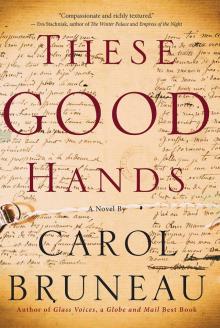 These Good Hands
These Good Hands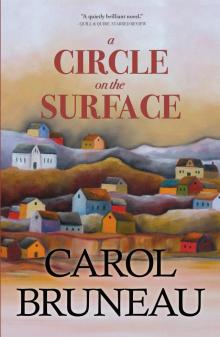 A Circle on the Surface
A Circle on the Surface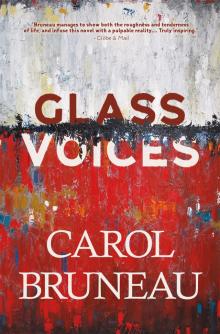 Glass Voices
Glass Voices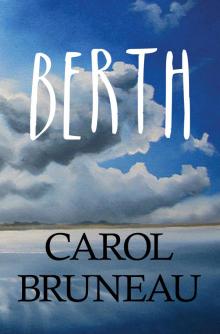 Berth
Berth Brighten the Corner Where You Are
Brighten the Corner Where You Are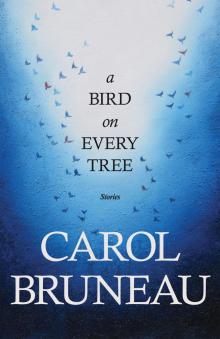 A bird on every tree
A bird on every tree